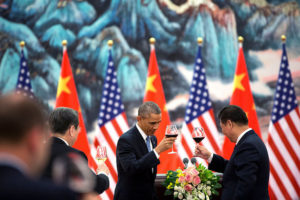
President Barack Obama offers a toast to President Xi Jinping of China during a State Banquet at the Great Hall of People in Beijing, China, Nov. 12, 2014. (Official White House Photo by Pete Souza)
UPDATE 3.31.23: China sees the danger of a concerted Western effort to curb its power over global trade. The country’s communist government has dispatched Fu Cong, its ambassador to the EU, on a mission to scare the bloc’s countries away from joining U.S. efforts. Sam Fleming, Henry Foy and Andy Bounds report in the Financial Times:
Europe should reject Washington’s demands to curb trade with Beijing, a senior Chinese diplomat said, warning any country that shredded business ties with his nation would do so “at their own peril”.
Fu Cong, China’s ambassador to the EU, claimed the US would “stop at nothing” to disrupt normal relations between the bloc and China, adding that a “protectionist tendency” was on the rise in Europe.
“Who in their right mind would abandon such a thriving market as big as China?” Fu told the Financial Times, warning European politicians not to undermine positive business sentiment towards China. “It will only be at their own peril.”
The ambassador singled out the Netherlands for having “yielded to the pressure of the US” by announcing restrictions on exports to China of its high-end semiconductor-making technology this year. He hinted Beijing could retaliate depending on the extent of the controls.
“We do hope that the European governments and the European politicians can see where their interests lie and then resist the unwarranted pressure from the US,” Fu said, urging the EU to persist in its drive for “strategic autonomy”.
Referring to the Netherlands, he added: “They need to be mindful of the fact that China cannot just sit there and see its own interests being trampled like this without taking any actions in response.”
Originally posted December 20, 2016.
The way out for America is shown by the powerful movement labeled “resilient communities“ described here in theamericanconservative.com.
Through the modern age, communities have found themselves increasingly looking to the outside world for their needs. This began with security. As the state rose and asserted a monopoly on armed violence, communities no longer had to man their walls. Eventually those walls disappeared.
In the 20th century, the trend broadened. Instead of relying on local agriculture for food, it was shipped in on national networks such as the rail system. Local electric-power companies, which often began as streetcar lines that sold surplus power, were absorbed into regional systems.
Globalism has made us dependent on foreign countries for many things. This is true even of finance. The money to sustain our debt-based economy and government mostly comes from abroad.
With dependence comes vulnerability. Much of the world’s oil originates in unstable regions.
A new movement called “resilient communities” is addressing this question. The basic answer is that through a combination of new technologies and revived old ways of living we can relocalize the systems our lives depend on.
What potential challenges face a community that wants to become resilient? The first is security. If global or national systems fail, the local government and police force will not vanish. They are the basis for local security. Beyond them, a community may need a militia. This is tricky, because militias can bring disorder. The key is to have only one militia, built on the local remnants of the state, i.e., the National Guard. Competing militias must be ruthlessly suppressed.
Beyond personal safety, a community’s first need is potable water. A local ability to treat river, stream, or lake water would be important, or, alternatively, a program to give each block a hand-pumped well before disaster strikes.
Realists know that big systems mean big failures. Our lives will always be local, and if our locality can provide all the things we need to live, we are secure. Were we to divert the $1.4 trillion slated for the F-35 fighter/bomber to helping communities become resilient instead, we might actually get something for the money.
Our family spends time weekly building on our long standing approach to “resilient communities”. We look to achieve the goals mentioned above on our individual properties. You will find a regular series of posts at richardcyoung.com detailing our on going efforts.
If you’re willing to fight for Main Street America, click here to sign up for my free weekly email.




